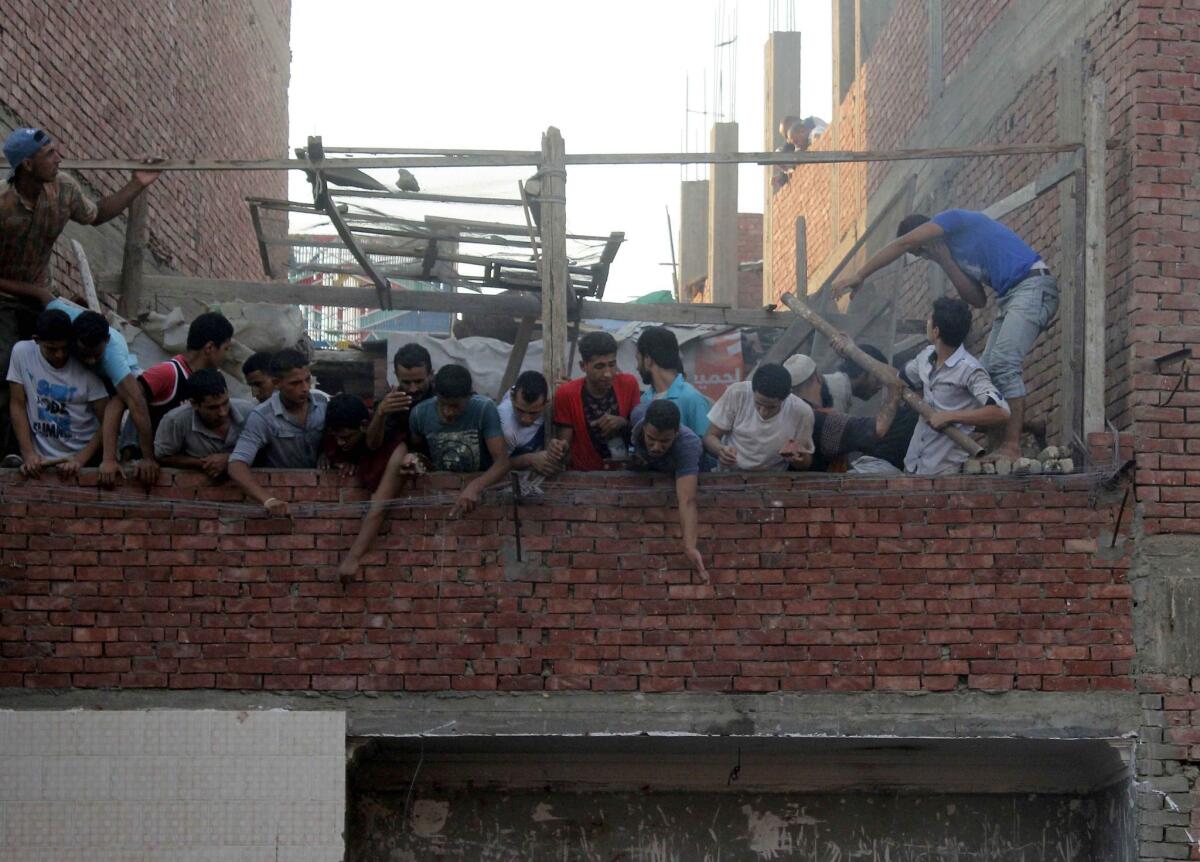Egypt’s authorities under fire for sectarian killing

CAIRO -- The bloodied bodies of four men were dragged over a village road in what one witness described as a public lynching.
The victims – Shiite Muslims – were attacked and killed Sunday in a rampage reportedly led by radical Sunni Muslim preachers. Shiites comprise a fraction of Egypt’s predominately Sunni population, but the clerics had stoked sectarian mistrust in the poor village of Zawyat Abu Musalam.
“For three weeks the Salafist sheikhs in the village have been attacking the Shiites and accusing them of being infidels and spreading debauchery,” Hazem Barakat, a witness who videotaped the incident, told the Egyptian media.
Barakat posted footage of the violence on the Web. The sins of a seething small town – not far from the great pyramids -- flashed across Twitter and onto TV screens, and suddenly Egypt glimpsed a menacing image of itself in these times of division and manipulated hate.
The pictures show men and boys brimming with rage, swinging fists. They encircled their victims, who rolled in the dust and then lay still at the sandaled feet of their tormentors. A Shiite house was set ablaze. Blood speckled dirt roads. The police were called, but reports said they did not do enough to prevent the massacre.
“They (the police) were just watching the public lynching like anyone else and did not stop anything,” Barakat told the Ahram Online news website.
Hassan Shehata, one of Egypt’s leading Shiite voices, was among those killed. He was in town for a religious festival and had been accused by villagers of disparaging revered Sunni holy figures.
The state news agency MENA reported that Shehata and three other Shiites, who were told by the mob to leave the town, sustained “numerous puncture wounds and severe bruising.”
The bloodshed came as radical Salafi voices are growing more pronounced in an Egypt torn by political unrest, poverty and a nascent sectarianism, which is exploiting suspicions between Muslims and Christians and inflaming age-old enmity between Shiites and Sunnis.
The opposition Dustour Party blamed President Mohamed Morsi’s government for Sunday’s slayings. It said in a statement that “this heinous crime [was] a direct result ... of the disgusting religious hate speech that goes on escalating with the knowledge of the regime and the blessings of the president.”
The killings followed a rally a week earlier in a Cairo stadium, where Salafis cheered Morsi when he announced that Egypt was breaking diplomatic ties with Syria. The civil war in Syria has lately been tinged by growing sectarianism as mostly Sunni Muslim rebels battle government forces loyal to President Bashar Assad, a member of the Alawite sect, an offshoot of Shiite Islam.
Radical preachers at the rally urged Morsi and his Muslim Brotherhood party to instigate a holy war against Assad’s regime. Morsi and the clerics also condemned Lebanon’s Shiite militant group Hezbollah for fighting alongside Assad’s army against the rebels.
Morsi on Monday denounced the violence in Zawyat Abu Musalam, saying “the state will not be lenient with anyone who tampers with Egypt’s security or the unity of its people.”
The political wing of the Muslim Brotherhood, which controls the government, said the killings violated Islam.
“It is forbidden to Muslims to spill Egyptian blood,” Essam Erian, deputy leader of the Freedom and Justice Party, wrote on his Facebook page. “All Egyptian blood -- Muslim or Christian, man or woman, Sunni or Shiite, civilian or police. Whoever takes part in shedding blood, even in words ... or by hate speech, is taking part in a terrible crime.”
ALSO:
Israeli airstrikes follow rockets from Gaza
Nelson Mandela remains in critical condition
Ecuador official appears sympathetic to Edward Snowden
More to Read
Sign up for Essential California
The most important California stories and recommendations in your inbox every morning.
You may occasionally receive promotional content from the Los Angeles Times.











